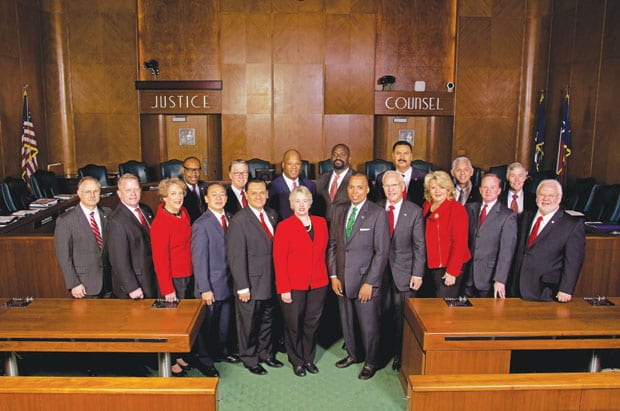After a two-week delay to consider amendments, HERO passed the Houston City Council

PASSAGE | Houston Mayor Annise Parker, front center, and the Houston City Council passed HERO, the Houston Equal Rights Ordinance on Wednesday with an 11-6 margin.
HOUSTON — A provision in Houston’s proposed equal rights ordinance that passed Wednesday provoked a protest outside Houston City Hall by 300 religious conservatives and caused some in the trans community to withhold support earlier in the debate.
The ordinance passed on May 28 by a vote of 11 to 6 after almost 10 hours of public comments and a vote on a number of proposed amendments that delayed the vote by two weeks.
Transgender Education Network of Texas Executive Director Katy Stewart called an original provision in the ordinance unnecessary and said changes made it worse. Councilman Jerry Davis proposed an amendment to remove the contentious item.
The removed item said no business open to the public could deny a transgender person entry to a restroom consistent with his or her gender identity.
Stewart said the original provision allowed a business to discriminate based on how that business perceived someone’s gender identity.
The change allowed a business to discriminate based on its perception of “supposition of crime.”
“Businesses can take an arbitrary position,” Stewart said.
She said separating out the bathroom issue was a bad idea, because it called attention to something that is already covered. The section preceding the removed item makes it illegal for “any place of public accommodation or any employee or agent thereof to intentionally discriminate against any person on the basis of any protected characteristic.”
Gender identity is one of the protected characteristics along with sex, religion and a list of others.
“We were very glad to see it removed,” Stewart said.
Monica Roberts, who heads the Houston chapter of Black Trans Women, attended the council debates.
“As written, it would have added a layer of protection,” she said, “but opponents convoluted it.”
She said the ordinance already does what the trans community wanted.
Roberts called the religious right’s tactics a “fear and smear” campaign.
“Because they’re losing so badly on marriage, they have to come up with another way to justify their existence,” she said. “So they’re demonizing the trans community.”
Houston trans leader Lou Weaver said the way the ordinance was originally written was just wrong.
“You don’t need to say gay people can go to the bathroom,” Weaver said. “You don’t need to say trans people can go to the bathroom.”
Speaking for Equality Texas, Field organizer Daniel Williams said, “We enthusiastically endorse the Davis amendment. Based on extensive input and discussion, we sought with leaders in the transgender community both in Houston and around the state.”
Religious right leaders who spoke at City Council and protested outside said the ordinance would allow sexual predators into women’s bathrooms to attack women and children. They dubbed the new law the Sexual Predator Protection Act.
The law includes protections based on religion as well as a long list of other protected characteristics.
Until it’s passage, Houston was the largest city in the U.S. and the only major city in Texas without a nondiscrimination ordinance.
“The ordinance was 30 years in the making,” Roberts said.
In the 1980s, a much narrower ordinance covering sexual orientation in city employment was repealed, and the city has had no local nondiscrimination ordinance protecting any category since.
Roberts commented on how divisive the ordinance debate has been, citing Houston Councilwoman Brenda Stardig as an example. Stardig, who has a gay brother, voted against the ordinance.
This article appeared in the Dallas Voice print edition May 30, 2014.

